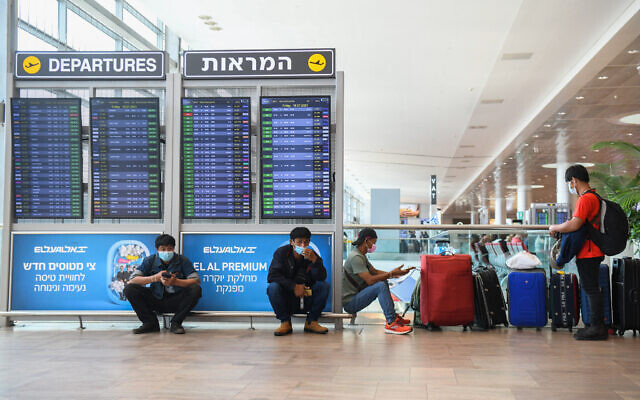Prime Minister Naftali Bennett said on Sunday that technical means would be used to check the location of those in quarantine, asking the attorney general and the minister of public security to examine the legal implications of such a move.
According to a statement from the Prime Minister’s Office, the premier conveyed his request to Attorney General Avichai Mandelblit and Public Safety Minister Omar Barlev at a meeting of officials regarding increased enforcement of coronavirus rules.
The system will allow police to track the locations of people who are in quarantine by sending a text message with a link to their phones. When the person in isolation clicks on the link, their physical location is immediately shared with law enforcement.
It was unclear how the system would work for people who don’t have phones, such as young children, or who choose not to carry them when they leave the house.
Earlier this year the previous government had announced the use of this system, but it was ultimately barely used.
Under the current system, those in isolation are told that they can meet the police at any time, but this is rarely the case in practice.

Prime Minister Naftali Bennett holds a press conference in his office in Jerusalem on July 14, 2021. (Noam Revkin Fenton / Flash 90)
The statement announced that officers present at the meeting, which included Israel’s Police Chief Kobi Shabtai and Health Minister Nitzan Horowitz, agreed that criminal charges would be filed against those who knowingly violated the quarantine rules.
Along with reducing the time between imposition of fine and its payment, the process of imposition of penalty will also be streamlined.
In addition, mass events and celebrations – with a special emphasis on weddings – will be a top priority for enforcement. The statement mentioned the possibility of widespread infection as a result of those gatherings.
Israel is expected to see a major increase in enforcement this week, as local municipal inspectors work with police to fine people who are found in indoor spaces without face coverings.
The scrutiny will also be increased on those forced to self-isolate.
Implementation of all the rules of the epidemic will be under the supervision of the Ministry of Public Security.

People shop at the Mahane Yehuda market in Jerusalem on July 15, 2021. (Yontan Sindel/Flash90)
“Our goal is to establish sensible guidelines, along with aggressive and effective enforcement against those involved,” Bennett said in a Sunday statement. “Anyone who violates the sanctions puts their health and that of the rest of Israel’s citizens at risk.”
“The implementation of sanctions is an important component in managing the pandemic in order to defeat it” [Delta] version,” Bennett said.
Army Radio reported on Sunday that health officials were unhappy with the “Ravalry Pass” system to be implemented from July 21, under which rapid tests are to be deployed at the entrances of large indoor events, such as weddings, where those without vaccinations will take place. One needs to show a negative test result to get admission.
Anonymous health officials told the radio station that the government should instead immediately reintroduce Green Pass vaccination certificates – which will once again limit attendance at performances, restaurants, hotels and gyms – in light of the continued rise in new coronavirus cases. In.
The latest figures from the Ministry of Health on Sunday showed that 430 new coronavirus cases were diagnosed on Saturday – the testing rate, and therefore the number of cases reported is lower than over the weekend.
However, there were 1,118 cases diagnosed on Friday, which is the highest rate in nearly four months.
There were 63 patients in critical condition as the total number of cases continued to rise, but there was only one area classified as an area of high infection under the health ministry’s “traffic light” system – the central Israel agricultural village of Beit Yitzhak- Shar Hefer. .
Meanwhile, the health ministry announced on Sunday that admission to the summer camp would depend on participants who show a certificate of vaccination or recovery, or test negative coronavirus for the past 72 hours. This restriction also applies to summer camps providing accommodation in tents as well as buildings.
In an interview with Channel 13 on Saturday, Sharon Alroy-Preis, the head of public health at the Ministry of Health, said action needed to be taken to limit the number of cases coming into Israel from abroad.
“We are not in the phase of shutting down air travel, but we need to find a way to reduce the risk from countries around the world,” she said.

Dr. Sharon Alroy-Preis, Head of Public Health Services at the Ministry of Health, at a news conference in Jerusalem on June 23, 2021. (Jonatan Sindel/Flash90)
Alroy-Preis also took up the case of the United Kingdom, which has seen a rapidly rising number of cases and is set to lift all remaining restrictions on Monday. according to a report Britain could soon be added to the banned travel list by the Cannes public broadcaster on Saturday.
“Morbidity is rising around the world, and 21 coronavirus cases were discovered in travelers arriving from the United Kingdom,” Alroy-Preiss said, without giving a time frame for the discovery of those cases. “This issue needs to be re-examined.”
Starting Friday, all passengers, including those who have been vaccinated or have recovered from COVID-19, are required to self-isolate for 24 hours upon arrival in Israel or for a shorter period if a negative test result is received.
As per the ministry’s updated guidelines, returnees from 15 countries with high infection rates with negative test results are required to be quarantined for seven days. The complete quarantine period was recently shortened from the last 10-14 days.
Countries with high infection rates are considered to be the United Arab Emirates, Seychelles, Ecuador, Ethiopia, Bolivia, Guatemala, Honduras, Zimbabwe, Zambia, Namibia, Paraguay, Chile, Colombia, Costa Rica and Tunisia.

Passengers are seen at Israel’s Ben Gurion International Airport on July 15, 2021. (Flash90)
Starting next Friday, 23 July, the following countries will be added to the list: United Kingdom, Cyprus, Turkey, Georgia, Uganda, Myanmar, Fiji, Panama, Cambodia, Kenya and Liberia.
Spain and Kyrgyzstan will be included in the list of countries where Israelis have been barred from flying because of high infection rates from July 23, the health ministry said on Friday – provided a government committee approves the ministry’s request. .
The countries currently off-limits for Israel are Uzbekistan, Argentina, Belarus, Brazil, South Africa, India, Mexico, and Russia. Israelis entering the country after visiting any of these countries could face a NIS 5,000 ($1,500) fine.